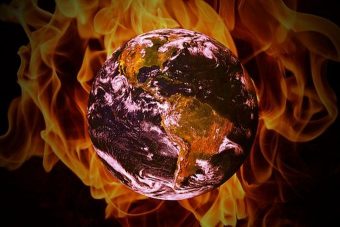
The National Climate Report is an annual assessment mandated by Congress. This year’s report has just been released and it contains this stunning finding — virtually all of the observed increase in average global temperatures since 1950 is the result of human activity, primarily the burning of fossil fuels.
The 600 page report was created from input by scientists working at 13 different federal government agencies. “Based on extensive evidence … it is extremely likely that human activities, especially emissions of greenhouse gases, are the dominant cause of the observed warming since the mid-20th century,” the report says (emphasis in original text). Noted climate scientist Michael Mann tells ThinkProgress, the report “indicates that a path of inaction will truly lead to disastrous climate change impacts.”
The NCR claims that the “business as usual” approach, much favored by the Trump administration, will lead to some nasty consequences for people living in North America. Average temperatures over the central part of the country would rise by 8 to 10 degrees Fahrenheit. Prolonged drought conditions in the west would seriously damage the nation’s ability to grow enough food to feed its citizens. Rising oceans would inundate almost all of America’s coastal cities. Further north, temperatures in the Arctic would increase by 18 degrees Fahrenheit.
The report has been peer reviewed by the National Academy of Sciences. “For the warming over the last century, there is no convincing alternative explanation [other than human activity] supported by the extent of the observational evidence,” it states. In fact, it suggests that, but for human activity, the earth would most likely have seen a slight cooling trend during that period. Is this a “worst case scenario?” No, it is not. The “climate models are more likely to underestimate than to overestimate the amount of long-term future change,” the NCR warns.
Okay, that’s the word from the scientific community. Either humans come together in a concerted global effort to rein in carbon emissions or face a future where famine and flooding — and the armed conflicts they will lead to — are the norm. One would think that rational people would find that an easy choice to make. But history teaches us that armed conflicts are plentiful, and examples of global cooperation are few. In fact, if you can think of one, please share it with us.
Nothing, it seems, can make us realize that using the earth as a communal toilet is a bad idea. It’s like trying to understand at some basic, existential level that we are all going to die someday. The reality is just too awful to confront, so we deal with it by not dealing with it. Fouling our own nest must be okay because that’s what humanity has always done and we’re still here, aren’t we? Surely, we will always be here, right?
Actually, no, we haven’t always been here and there is no guarantee we always will be. One of the only common threads running through all human experience is the legend of the Great Flood. All humans — even people on remote Pacific islands — share a narrative about a time long, long ago when the earth was flooded and only a very few survived.
Who will the Walton family sell their low-priced products to then? What good will fossil fuels be if there are no cars to drive, homes to heat, or factories to run? Will anyone even know we were here a million years from now when the waters recede and all records of our existence have been lost? Will genetic mutations make the next humans smart enough to work together rather than devising new and interesting ways of killing each other? Based on the history of humanity to date, the most likely answer is no.
As if to make the point even more forcefully, neither the front page of the New York Times nor the Washington Post makes any reference to the National Climate Report. Nothing to see here, move along. Nothing to see here, move along. And soon, there really will be nothing to see except wave tops as the land is swallowed by the ocean once again.
Source: cleantechnica.com



